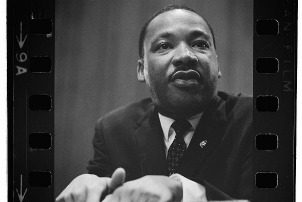

If you agree that leadership is about influencing others, not position power, then you share my belief that Martin Luther King Jr. is one of America’s greatest leaders. King’s ability to influence millions and change our nation’s history was based, in large part, on his skill in reframing.
Reframing is the ability to consciously think about a situation in a different and better way to change how you interpret the situation, the actions you take and the results you achieve. In addition to being a skill you can use to help yourself achieve extraordinary results, reframing is an effective skill when influencing others.
When Martin Luther King Jr. spoke at the March on Washington in 1963 and gave his famous “I Have a Dream” speech, he reframed the civil rights movement from a struggle of mighty proportions to an inspiring dream embraced by many. Before the famous march, many people thought of civil rights as a “black problem” or a “southern problem” or even a states’ rights issue. With this view, there would be no success. However, King successfully reframed the issue as a mainstream problem around national identity.
The March on Washington was designed not to rally the faithful, but to appeal to mainstream America. Instead of civil rights being someone else’s problem, he helped us see it as our problem. King understood that focusing just on blacks would not solve the problem. He needed to bring blacks and whites together. King reframed the conflict from equal rights for blacks to the war on poverty, an issue that transcends race.
King’s famous speech also invoked the Declaration of Independence. It spoke not just to the problems of blacks, but to the founding principles of the nation. That approach “educated” Robert Kennedy and changed his heart, leading to the Civil Rights Act of 1964.
King also reframed many people’s views regarding his strategy of nonviolence. Critics of nonviolence framed the approach as weak, cowardly and ineffective. In contrast, King reframed nonviolence as strong, powerful and effective. He correctly argued that easy and quick solutions, such as violence, are rarely the right solutions. As King said, “Hate multiplies hate and violence creates more enemies.”
King also argued that not responding to hate and violence with hate and violence takes much greater strength and mental capacity. “Nothing pains people more than having to think,” he once said. When it came to mental toughness, he not only talked the talk, he walked the walk.
He learned to channel his own anger into energy, commitment, sacrifice and purpose. He infused people around him with this form of constructive anger so they were also infused with energy commitment, sacrifice and purpose. “The supreme task [of a leader] is to organize and unite people so that their anger becomes a transforming force,” he said in Freedomways magazine in 1968.
A stiff test came his way one night in 1956 when his Birmingham, Alabama home was bombed by white extremists. In his autobiography, he wrote: “While I lay in that quiet front bedroom, I began to think of the viciousness of people who would bomb my home. I could feel the anger rising when I realized that my wife and baby could have been killed. I was once more on the verge of corroding hatred. And once more I caught myself and said: ‘You must not allow yourself to become bitter.’ ”
How does King’s leadership apply to us today at work and in our personal lives? Each of our lives is filled with conflict and numerous pressure situations. But our inner cave dweller’s highly emotional fight, flight or freeze instinct is often our first reaction. Consider the road rage we encounter before we even reach the office.
Fortunately, we don’t need to act on this prehistoric instinct intended to protect us from physical threats. Instead, we can reframe our thinking by choosing a different and better response to the psychological threats we encounter. A response that comes from the part of our brain responsible for conscious thought. One that will lead to better actions and better results. Thank you, Dr. King, for serving as a great role model.
Judd Hoekstra is director of client solutions at the Ken Blanchard Cos. and co-author of “Crunch Time: How To Be Your Best When It Matters Most.” Comment below or email editor@CLOmedia.com.



